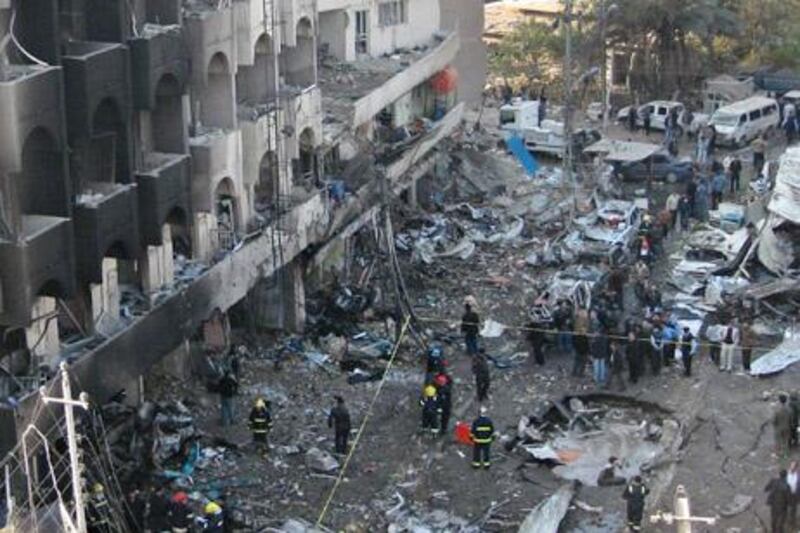BAGHDAD // A wave of violence ripped across Baghdad this morning, killing at least 49 people and injuring nearly 200 in a coordinated attack designed to wreak havoc in the Iraqi capital just days after US forces left the country.
The blasts were the worst violence since a political crisis between Iraq's Sunni and Shiite factions erupted this weekend. The political spat, which pits Iraq's Shiite prime minister against the highest-ranking Sunni political leader, has raised fears that Iraq's sectarian wounds will be reopened during a fragile time when Iraq is finally navigating its own political future without US military support.
Iraqi officials said at least 12 blasts went off in nine neighbourhoods around the city. The explosions ranged from blasts from sticky bombs attached to cars to roadside bombs and vehicles packed with explosives.
Most of the attacks appeared to hit Shiite neighbourhoods although some Sunni areas were also targeted.
The spokesman for the Iraqi health ministry put the death toll at 49 people and said at least 167 people were also injured. He did not have a breakdown of where the dead and injured were killed. Other reports said as many as 57 people were killed.
Earlier reports indicated that the worst of the violence occurred in Al Amal neighbourhood where seven people were killed in a blast that appeared to target rescuers and officials who came to the scene after a previous explosion. At least four people were killed in one western Baghdad neighbourhood when two roadside bombs exploded.
All the information came from police and hospital officials who spoke on condition of anonymity because they were not authorised to speak to the media.
In the southwestern neighbourhood of Karrada, where one of the victims was killed, sirens could be heard as ambulances rushed to the scene and a large plume of smoke rose over the explosion site.
"My baby was sleeping in her bed. Shards of glass have fallen on our heads. Her father hugged her and carried her. She is now scared in the next room," said one woman in western Baghdad who identified herself as Um Hanin. "All countries are stable. Why don't we have security and stability?"
While Baghdad and Iraq have become much safer over the years, explosions like today's are still commonplace.
The government of the prime minister, Nouri Al Maliki, has accused the Sunni vice president, Tariq Al Hashemi of running a hit squad that targeted government officials. Mr Al Maliki is also pushing for a vote of no-confidence against another Sunni politician, the deputy prime minister Saleh Al Mutlaq.
Many Sunnis fear that this is part of a wider campaign to go after Sunni political figures in general and shore up Shiite control across the country at a critical time when all American troops have left Iraq.
There was no immediate claim of responsibility for the morning's violence. But the coordinated nature of the assault and the fact that the attacks took place in numerous neighbourhoods suggested a planning capability only available to Al Qaeda in Iraq.
Many of the neighbourhoods were also Shiite areas which are a favourite target of al-Qaida. The Sunni extremist group often targets Shiites who they believe are not true Muslims.





